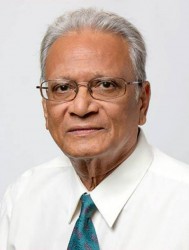Saying the public education system “is not truly free,” Education Minister Dr Rupert Roopnaraine hopes to do away with the need for extra lessons that can cost parents hundreds of thousands of dollars a month.
“My own feeling is that we have to ensure the kind of experience in the classroom that makes extra lessons a thing of the past,” Roopnaraine told Stabroek News in a recent interview.

He shared his disgust with reports he received of teachers who were not teaching in school so as to create a demand for the extra lessons they offer. “There is something really appalling about… teachers who are supposed to be teaching in the classroom, [not teaching] … then [they] go to some bottom house and teach exactly what they should’ve been teaching in the classroom and get paid for it,” Roopnaraine said, while adding that the practice “has to stop.”
The question of extra lessons has been an ongoing issue for the Ministry of Education over several administrations. In 2008, then PPP/C minister of education Shaik Baksh declared that teachers would be prohibited from giving extra lessons in classrooms, once it was for pay. At that time, the minister was reported as saying that the “lessons syndrome is hitting the educational system hard.” He also said many of the teachers who offered extra lessons after school short-changed their pupils during normal school hours.
Conventional examination of the extra lessons “syndrome” has focused on how poor teacher remuneration has contributed to its development as well as how the proliferation of extra lessons has denied students a well-rounded childhood. Many commentators have argued that the extra lessons syndrome, which can see students attending classes from six in the morning to eight at night for seven days a week, deprives them of playtime (which is essential to the development of social skills), while contributing to academic burnout. Few commentators have even addressed how certain ministry policies, such as the Grade 2 and Grade 4 assessments at the primary level and the encouragement of the sitting of numerous subjects at the secondary level have contributed to the expansion of the extra lessons industry. At the same time, the daily five hours of instruction time in the school system only allow for the adequate timetabling of a maximum of nine subjects, while students are writing as many as 20 subjects, which puts a strain on teachers to complete the various syllabi and in many cases necessitates extra lessons. There are also several cases of extra and co-curricular activities, such as sporting competitions organised by the ministry taking place during school hours and further minimising instruction time.
In response, Minister Roopnaraine shared his bewilderment that students were writing so many subjects. “I have been very puzzled by the number of subjects children are doing year after year. I don’t know what it means to be doing so many subjects,” he said.
Ropnaraine spoke of his time at secondary school when academic instruction ended at three and the “fun part of school” began. “Life in school was a full experience with endless societies and experiences beyond school hours,” he reminisced.
One of his main plans is to limit the number of subjects students are able to write, while reintroducing several extra and co-curricular activities. These interventions, in addition to improved teacher remuneration, according to Roopnaraine, should offer students a fuller education, while making extra lessons a thing of the past.





